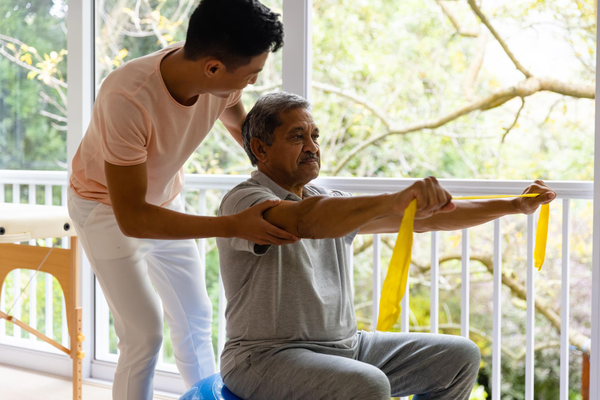
Last updated on by MRC
When pain lingers beyond the normal recovery period or arises without an apparent cause, it may no longer be a temporary discomfort but a chronic condition. It’s an enduring battle that affects every aspect of life, from physical health to mental well-being and overall quality of life. Unlike acute pain, which signals a short-term issue, chronic pain persists for months or even years. It can affect every aspect of life, from physical activity to emotional well-being. This constant struggle often goes unnoticed, as many people fail to recognize its seriousness or delay seeking help. This guide talks about signs of chronic pain, its common types, and causes, that necessitate professional help.
Chronic pain is a persistent discomfort that lasts beyond the usual healing period, typically exceeding three months. It’s not merely a symptom but a condition that disrupts daily functioning and can lead to anxiety, depression, and sleep disorders. Unlike acute pain, which serves as the body’s warning system for harm, chronic pain management persists and becomes a condition in itself. That is why it requires focused management and care due to its multifaceted nature.
Chronic pain manifests in various forms, each affecting individuals differently. Here are some of the most common types:
Each type demands specific chronic pain treatment tailored to its cause.
The origins of chronic pain are diverse and sometimes elusive. Understanding the root cause is crucial for effective chronic pain management.
Common causes include:
You Should Know This: Chronic Pain and Depression: How They are Linked and How to Treat Both
While everyone experiences pain differently, some clear signs of chronic pain suggest it’s time to consult a professional for chronic pain treatment. Here are 10 key indicators:
If your pain lasts more than three months without improvement, regardless of its intensity, it’s a clear sign of chronic pain. Chronic pain is not just physical; it impacts mental health, work, and relationships. Ignoring it may lead to worsening conditions.
Pain that prevents you from falling asleep or staying asleep not only worsens physical discomfort but also leads to fatigue, reduced immunity, and emotional instability.
When simple tasks like walking, bending, or climbing stairs become challenging due to persistent pain, it signals a need for specialized care.
Frequent use of over-the-counter medication for pain relief can signal a deeper problem that needs medical intervention.
Chronic pain often coincides with anxiety and depression, creating a cycle that exacerbates both physical and emotional suffering. If this is affecting your daily life, a pain specialist in Kolkata can help break the loop.
Constant pain drains energy levels, making everyday tasks feel exhausting even after sufficient sleep. Fatigue coupled with pain is a hallmark of conditions like fibromyalgia.
Pain that begins to spread from its origin to other areas of the body may indicate nerve involvement and requires immediate medical evaluation.
Pain combined with gastrointestinal discomfort could signify conditions like irritable bowel syndrome.
Random surges in pain intensity, even without identifiable triggers, often signal an underlying chronic condition.
When chronic pain steals joy from hobbies, social gatherings, and relationships, professional intervention becomes essential to reclaim quality of life. If you identify with these signs of chronic pain, consult a professional for timely chronic pain treatment.
Ignoring chronic pain can lead to severe complications, including long-term disability. Consulting a pain specialist ensures accurate diagnosis and personalized chronic pain management plans. Professionals use various methods, such as:
Also Explore: Chronic Pain Management and Physiotherapy for Elder Citizen in Kolkata—Rehabe India
MRC (Medical Rehabilitation Center) is a trusted name in Kolkata for chronic pain treatment. Known for its multidisciplinary approach, MRC combines diagnostics, medical interventions, and integrated therapeutics under one roof. Their services include:
Operating 365 days a year, MRC, the best pain clinic in Kolkata, offers a comfortable and patient-centric environment, making it the best choice for pain management in Kolkata.
Chronic pain doesn’t have to dominate your life. Recognizing the signs early and seeking help can restore your well-being. Whether it’s addressing the root cause, improving mobility, or managing emotional stress, timely intervention by a pain specialist in Kolkata ensures you’re on the path to recovery. Don’t let chronic pain hold you back—take the first step towards a healthier, pain-free life today.
Chronic pain can cause changes in your brain and nervous system. These changes can cause the brain to continue to send out pain signals, even when there’s no harm or damage. The signal pathway to the brain can become over sensitive meaning the signals are amplified.
Trigeminal neuralgia or tic douloureux is a chronic pain condition that affects the trigeminal or fifth cranial nerve. It is one of the most painful conditions known.
Persons with chronic pain are placed at Grades 1, 2 or 3. Among persons with chronic pain, those who report that pain limits their life activities or work on most days or every day in the past 3 months (Item 2) are placed at Grade 3 (High impact chronic pain).
MRI is one of the most widely used modalities for the study of chronic pain. It combines a strong magnetic field with radiofrequency pulses to display high-spatial-resolution structural images.









